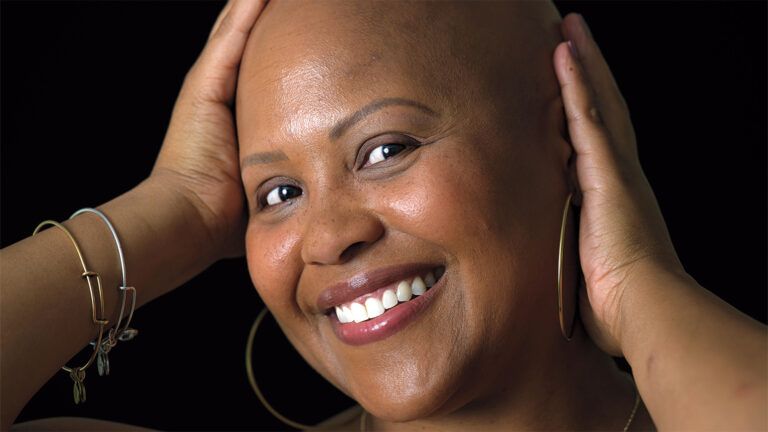That September afternoon I was in my lab going over research topics with grad students I supervise at Cal State-Fullerton.
I’m a psychology professor, and since my area of expertise is industrial/organizational psychology, the ideas focused on people’s behavior in the workplace. But I wanted my students to be open to other possibilities.
“Is there some aspect of human behavior you’ve been wanting to understand?” I said. “Psychology can be applied to any problem to find a solution.”
Wait a minute. Was that reminder for my students or myself? Because there was definitely a problem I wanted to find a solution for. My weight.
Actually, the extra 30 pounds I carried was just a symptom. My real problem was overeating—compulsive snacking, to be more precise. I never thought this was something I’d have to deal with. Most of my life, people teased me about being too skinny.
In high school my parents made me drink weight-gain shakes. I even used to joke with my sister, “One day I’ll write a book about how to stay thin.”
Keeping eating under control didn’t seem like a big deal—I ate because my body and brain needed fuel to function, but I didn’t even like food that much.
That all changed after my husband, David, and I had kids. I wasn’t just a professor with a full load of teaching and research. I was a full-time mother too, with two young children. And I helped with our women’s ministry at church.
Even with the system I’d worked out—a calendar where I meticulously wrote in every chore, sports practice, school function, class, church meeting—staying on top of everything was draining.
My energy level crashed in the late afternoon. The time of day when my kids, 9-year-old Grace and 5-year-old Jack, had been home from school long enough to get restless, and I still had a ton of things to cross off my to-do list before David got back from work. So I’d put out snacks to keep the kids occupied and I’d grab some for myself. A few cookies, a handful of chips or cheese crackers, just enough to keep me going.
That was how my snacking started, with a little here and there. Before long, I was reaching for those pick-me-ups constantly, depending on them to give me a boost and sustain me through all my to-dos.
I found myself eager for my daily snacks—me, who never used to like food!—craving the taste of them, especially my favorite, buttercream cake frosting. Just yesterday I’d polished off a jar. That’s right—a jar. I couldn’t keep track of how many times I dunked my spoon into that rich, sugary frosting while I was doing the dishes, putting the kids’ toys away, letting the dog out. It was like my hands had a mind of their own. I couldn’t stop.
And that’s why I needed to apply psychology to my own compulsive behavior, I decided, so I could control it like I controlled everything else in my life. I looked around the lab at my grad students.
“I’ve been thinking about studying eating behavior,” I said. “Dieting.”
The students’ eyes lit up. This was something they could relate to.
“I’ll check what’s been done already,” I said. “Then we can zero in on topics that need to be researched.”
I pored through textbooks and journals and came up empty. If I wanted to uncover the psychological principles behind sticking to a diet, I’d have to do the research.
I posted on campus bulletin boards, asking for volunteer assistants. I knew I’d hit on something with my grad students, but I never expected this kind of response. There was a line at my lab door of students interested in helping me, many wanting to develop their own thesis projects on the subject.
We’d have to devise strategies to counteract bad eating habits. My students had smart ideas on portion control: divide a bag of chips into single-serving-size baggies; use smaller plates; have the waiter put half your meal in a doggie bag…before you start eating. We did visualization exercises, picturing the stomach at half its size, training our brains to take smaller helpings.
David got me into another kind of training. He used to be a Navy SEAL, but even he didn’t always eat healthy—look at all the potato chips and Oreos we plowed through sitting on the sofa watching NASCAR races.
“If I didn’t exercise, I’d be in trouble,” he said. I decided to hit the gym on my lunch break, a half hour on the stationary bike every day. I wore a Lance Armstrong Livestrong bracelet for motivation. It was tough to pedal for 30 minutes straight, but whenever I was tempted to quit, I looked at that bracelet and thought about all the people who wore it, many dealing with a lot worse than I was.
I’d made progress, but my snacking hadn’t stopped. I still hadn’t hit on the key to controlling my overeating. I knew it had to go beyond replacing unhealthy habits with healthier ones.
One winter day I came home from teaching to find our dog had gotten into the trash. What a mess! It took all afternoon to clean up. By the time I got things in order again, I was wiped out.
I cracked the windows to let some fresh air in. It was chilly so I put on mittens. My stomach growled. I’m hungry and tired, I thought. I could use a pick-me-up. I went to the pantry, straight to the candy shelf, and grabbed a chocolate bar. One little treat wouldn’t hurt, right?
I tried to rip the wrapper open, fumbling with those mittens on. The bar fell to the floor.
“Come on!” I cried, frustrated. I bent down, stretched my hand toward it. That’s when I heard it, a voice—coming from within or above, I wasn’t sure. “Do you really want to eat this?”
My hand stilled. What was I doing? I couldn’t even take my mittens off, I was that desperate for a sugar high? I slumped to my knees. “God, I’ve tried everything! My eating is still out of control,” I said. It was a relief to admit that.
“Only you can help me.” That admission was an even bigger relief. If I couldn’t control the simple urge for a candy bar, what ultimately did I control?
I slipped the mittens off and picked up the candy bar. Do I eat this? I’d gone for a snack out of reflex, uncontrollably, without conscious thought, but the mittens made me stop for a moment and actively assess what I was thinking and feeling. Now that I had, the urge was gone. I put the candy back on the shelf.
I needed more moments like that. And I needed something to remind me to press pause, let go of my impulse to eat, and listen—to God and to the real reasons I was reaching for food in the first place.
Something like the Livestrong bracelet that made me stop and think at the gym. Why not? I turned my yellow bracelet inside out and wrote on it in permanent marker: D.I.E.T. The letters stood for “Do I eat this?” Not quite “What would Jesus do?” but I hoped it would have a similar effect.
The next afternoon I rushed around as usual. I started the laundry then set out some peanut butter and crackers for the kids. My stomach rumbled. Just as my hand reached for the peanut butter jar, my eyes went to the bracelet on my wrist. Do I eat this? I had lunch. I’m not hungry, I realized. I’m stressed. I took some deep breaths and reminded myself, “Let go and let God.”
The bracelet was working. More and more when I stopped and asked myself, “Do I eat this?” I noticed I didn’t need food. I needed something else. A walk. A laugh with the kids. A date with David—we still watch NASCAR races side by side…on exercise bikes at the gym. Time with God—it turns out reading a page in my devotional book is much more satisfying than a bedtime snack, that prayer is the best pick-me-up there is.
It took a year to reach my ideal weight. By then the number on the scale seemed a minor accomplishment. I’d discovered the joy that comes from letting God fulfill my spiritual hunger.
I’d found the subject I love to teach is one that can teach me. And that research my students and I did? It was enough for a book. Not a book on staying thin, exactly. But a book on the psychology behind sticking to a diet, on how changing your life starts with changing your thinking.






